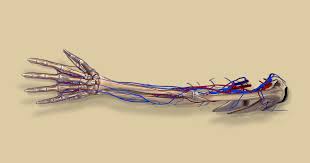In a groundbreaking advancement for cardiovascular medicine, researchers from the University of Edinburgh have developed 3D-printed blood vessels that could significantly improve outcomes for heart bypass patients. These innovative vessels, which closely mimic the properties of human veins, may soon offer a superior alternative to both human and synthetic veins currently used in bypass surgeries.
The new vessels are created using a cutting-edge 3D printing technology, resulting in strong, flexible, gel-like tubes. The process involves a two-stage technique: initially, a rotating spindle integrated into a 3D printer forms the grafts from a water-based gel. The second stage reinforces these grafts through electrospinning, which uses high voltage to produce thin nanofibers, coating the vessels with biodegradable polyester molecules. This combination yields vessels with mechanical properties comparable to natural blood vessels.
Dr. Faraz Fazal, lead author and researcher from the University of Edinburgh’s School of Engineering, emphasized the potential of this hybrid approach: “Our technique introduces exciting possibilities for fabricating tubular constructs in tissue engineering.”
Currently, heart bypass surgeries in England rely on either human veins, which can cause scarring and infection, or synthetic grafts, which often fail to integrate well with the body. With an estimated 20,000 bypass surgeries performed annually in England, the introduction of these 3D-printed vessels could address critical issues such as scarring, pain, and the risk of infection associated with vein removal. Additionally, these vessels could overcome the challenges posed by small synthetic grafts that struggle to integrate into the human body.
The new 3D-printed blood vessels can be manufactured in a range of diameters from 1 to 40 mm, offering flexibility for various medical applications. The next phase of the research will involve testing these vessels in animal models, followed by human trials in collaboration with the University of Edinburgh’s Roslin Institute.
Dr. Norbert Radacsi, principal investigator, highlighted the significance of the research: “Our findings address a long-standing challenge in vascular tissue engineering. With continued support and collaboration, we hope to offer improved treatment options for patients with cardiovascular diseases.”
The study, published in Advanced Materials Technologies, represents a significant step forward in the field of vascular medicine and tissue engineering. With promising results and ongoing research, the future of heart bypass surgery could be dramatically enhanced by these state-of-the-art 3D-printed blood vessels.












